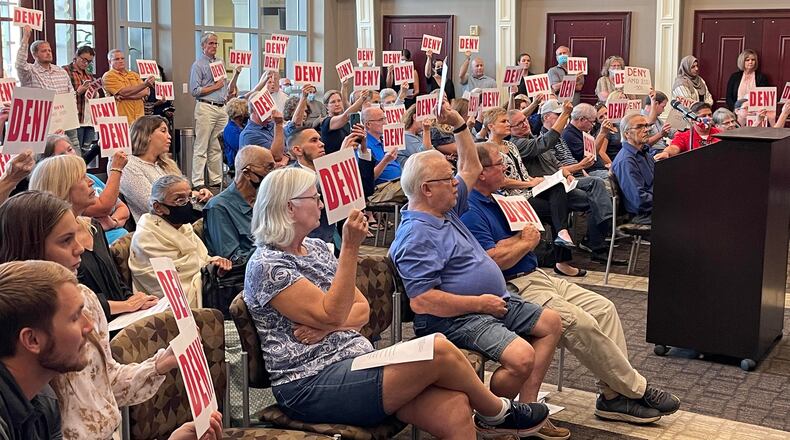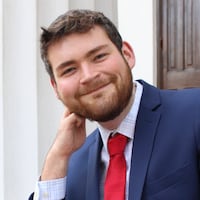Scores of disgruntled residents carrying paper signs with “Deny” written in bold, red letters packed the Suwanee City Council Chambers on Tuesday evening.
More than 50 people came out to object to a zoning change that would have allowed developers to apply for permits to build denser homes. Known as a “planned park neighborhood,” developers could have veered away from required lot sizes, setbacks and distances between lots if they set aside land for amenities or environmental preservation.
Longtime residents worried the permits would have given developers the power to shoehorn dense developments on small properties and lead to worsened traffic and declining property values.
Suwanee officials unanimously voted down the controversial amendment, which prompted claps and cheers from residents after the meeting ended.
“Any sort of update to our ordinances needs to be in alignment with the needs of the community, balanced with the standards that we have and the things that are outlined in the comprehensive plan,” said Mayor Pro Tem Linnea Miller after the vote. “This fell a bit short of that.”
Council’s decision came after the city’s Planning and Zoning Commission unanimously recommended approval of the amendment. Officials initially tabled the amendment earlier this year after residents questioned it.
“I’m really a bit surprised about it,” said resident Tom McConnell after the vote. “... If they had approved it, it would have been over for us existing homeowners. It would have been a nail through the heart.”
Credit: Tyler Wilkins
Credit: Tyler Wilkins
City officials told the AJC that misinformation spread and muddied the purpose of the ordinance. Council still would have considered the city’s comprehensive plan — a guiding document that includes the type of development expected in specific areas over the next few decades — before issuing permits.
“I understand and appreciate (residents’) concerns,” said Councilmember Beth Hilscher. “The folks I spoke to prior to the vote and explained the premise of the ordinance, they seemed to have a better understanding. Frankly, maybe we didn’t do a good job of making sure people understood (it).”
Under the proposal, City Council would have approved or denied each permit following “pre-application conferences,” conceptual plan submissions and public hearings.
The number of homes allowed in specific zoning districts under existing regulations would have remained the same with permits, but the homes could have been built on smaller lots or more closely together, Planning Director Josh Campbell previously told the AJC.
“The potential issue was not worth the potential gain,” said Councilmember Pete Charpentier. “It provided the potential to have smaller lots sizes in areas that are not appropriate. It would have taken quite a bit of rewriting to strengthen it, and I decided that was not worth the risk.”
Mike Sutherland, a retired builder who stood outside City Hall with a “deny” sign draped over his shoulders, worried the amendment would have given developers too much power. He said the dense development found around Town Center shouldn’t inundate the entire city.
Shelley Farr, a Suwanee resident who spoke during a public hearing, told the AJC that she believed the amendment would have benefited the city with tax revenue at the expense of existing residents.
“Our antennas are raised,” said McConnell, who helped distribute nearly 6,000 emails to residents before the meeting. “The battles are not over. There are going to be challenges from different interested parties — the developers.”
About the Author
Keep Reading
The Latest
Featured




